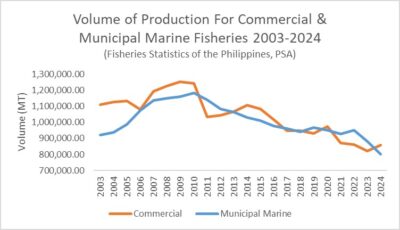A troubling tide: The problem of illegal fishing and declining catch
Press Release Date: July 9, 2025
The Philippines is grappling with a mounting crisis in its fisheries sector as illegal, unreported, and unregulated (IUU) fishing continues to surge, undermining the livelihoods of small-scale fishers and threatening national food security.
Recent findings from Karagatan Patrol, corroborated by the latest data from the Philippine Statistics Authority (PSA), Philippine Fisheries Development Authority (PFDA), and the Bureau of Fisheries and Aquatic Resources (BFAR) reveal a troubling pattern: marine fisheries production—both commercial and municipal— has been declining since its peak in 2010, while detections of apparent illegal commercial fishing in municipal waters are on the rise after the pandemic.

Tracking the surge in illegal fishing
Karagatan Patrol, the online platform established by Oceana in partnership with the League of Municipalities of the Philippines, has become a vital tool in detecting illegal commercial fishing inside municipal waters. Using satellite based VIIRS (Visible Infrared Imaging Radiometer Suite) technology, the platform monitors apparent commercial fishing vessel activity within the 15-kilometer municipal waters — where municipal fishers are given preferential rights to fish.
Recent data reveal a sharp increase in suspected illegal activity. Year-on-year analysis shows a steady upward trend, with VIIRS Boat Detections (VBDs) rising by 9% from 26,295 in 2022 to 28,822 in 2023 and further increasing by 10.5% at 31,843 in 2024.
These incursions are not isolated incidents. Identified hotspots include Zamboanga City, Cuyo in Palawan, San Pascual in Masbate, Tongkil in Sulu, Languyan in Tawi-Tawi, Pagbilao in Quezon, and Carles in Iloilo. Historical data show that Zamboanga City, for example, consistently tops the list for apparent illegal commercial fishing, with an average of 2,200 detections annually since 2018. The persistence of these violations, even during closed fishing seasons and the pandemic, underscores the scale and brazenness of illegal operators

Enhanced enforcement through transparency
Enforcement of fisheries and environmental laws requires effective monitoring, control, and surveillance measures. For this purpose, BFAR issued the Fisheries Administrative Order (FAO) 266 in 2020, setting the implementation guidelines of vessel monitoring measures and electronic reporting system.
Information obtained by Oceana from the BFAR showed that 90% of all licensed and qualified commercial fishing vessels have vessel tracking devices installed. Authorized disclosure of the data should be immediately implemented to help the local government units, the Philippine Coast Guard, and other enforcement agencies to effectively track the movement of commercial fishing vessels, monitor their movements for security and identify them, especially when they enter municipal areas and marine protected areas where they are prohibited to operate.
Local government officials and advocates warn that enforcement alone is not enough; systemic issues such as weak local governance and legal loopholes fail to deter and prevent IUU fishing. So, what happens when the rule of law fails?
Declining municipal fishery output
While illegal fishing intensifies, municipal fishery production – the backbone of coastal communities’ livelihoods – continues to decline. According to data from BFAR and the PSA, both municipal and commercial fisheries production have dropped over the past decade. The PFDA’s April 2025 report shows that, based on year-to-year comparisons, while some regional fish ports, like Navotas, posted modest gains, other ports such as General Santos, Bulan, and Lucena experienced declines in fish unloading volumes.
Over the past two decades, fisheries production data from the PSA show a consistent decline in catch volumes of top species, signaling an increasing pressure on fishery resources. Bali sardinella (tamban), peaked in 2010 at over 334,000 metric tons i, but went downhill to only around 253, 000 in 2024.
Frigate tuna (tulingan) and yellowfin tuna (tambakol/bariles) both have significant drops from their peak years, with catch volumes well below their levels in the 2000s. Tulingan production decreased by 62% from its 2004 peak. Tambakol production data showed a 46% decline from its 2008 peak. Round scad (galunggong), a species staple for municipal fishers and often called “the poor man’s fish” due to their accessibilitydropped by 46% from its 2007 peak.
This decline across commonly caught and economically important species is caused by multiple factors: overfishing, habitat destruction, and widespread illegal fishing, including the relentless intrusion of commercial vessels into municipal waters.
Analysis from the National Stock Assessment Program in 2017 indicates that 87% of Philippine marine fisheries stocks are now classified as overfished, a state that directly undermines food security and exacerbates poverty in coastal communities.
Destructive impacts
The implications of these trends are dire. Small-scale fishers, who rely on municipal waters for their catch, are displaced by commercial fishers with very little harvest, if not none at all. This erodes their incomes, deepens socio-economic inequalities, and threatens the country’s ability to meet its food-fish sufficiency targets. The destruction of marine habitats by destructive fishing methods further compounds the crisis, putting long-term fish stock recovery at risk.
Calls for stronger action
Advocates and local officials are calling for a multi-pronged approach to address the crisis. This includes full implementation of vessel monitoring measures, stricter enforcement of existing laws, and protection of marine habitats within municipal waters. BFAR has set an ambitious goal of achieving 100% food-fish sufficiency by 2028, but experts warn that this target will remain elusive without decisive action against IUU fishing.
As the Philippines confronts this escalating challenge, the message from Karagatan Patrol and fisheries stakeholders is clear: safeguarding municipal waters is essential for environmental sustainability and the survival and prosperity of millions of Filipino families.
Learn more about the #AtinAngKinse campaign.
